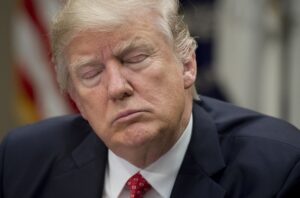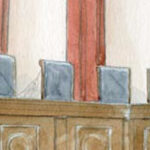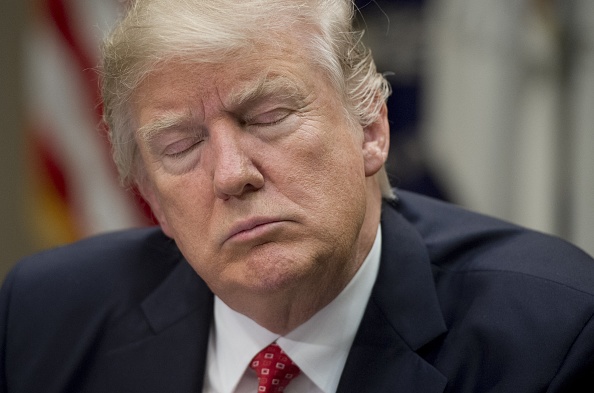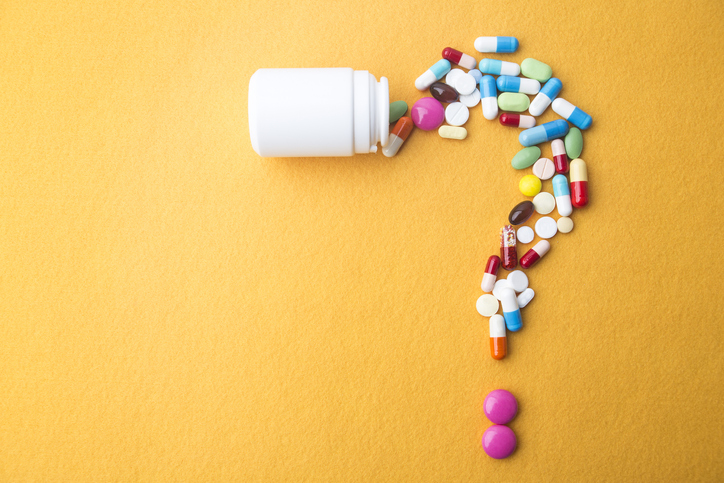
(Photo by SAUL LOEB / AFP) (Photo by SAUL LOEB/AFP via Getty Images)
The fallout from the Supreme Court ruling that presidents can do crimes continues.
On Wednesday, Donald Trump filed his “post trial presidential immunity motion” in the New York false business records case. It’s a typical Trump motion, full of bombast, snark, and cites to his favorite legal scholars, Jonathan Turley, Gregg Jarrett, and Andrew McCarthy.
“No President of the United States has ever been treated as unfairly and unlawfully as District Attorney Bragg has acted towards President Trump in connection with the biased investigation, extraordinarily delayed charging decision, and baseless prosecution that give rise to this motion,” Trump’s lawyers Todd Blanche and Emil Bove begin, making clear that they will once again be using the New York Supreme Court docket as a venue for performative screeching.
This is particularly annoying since they’re quite likely to succeed, thanks to six conservative justices who just invented an executive immunity broader than even Trump asked for. And so, even though Trump is charged with creating false records at his personal business, a crime which could not possibly implicate his official duties, he may well be able to vacate his conviction because it was secured with evidence of official acts.
To wit, White House aides Hope Hicks and Madeline Westerhout testified about Trump’s communication habits in the White House, as well as his relief that the story about the Stormy Daniels payoff came out in 2018, rather than in 2016 during the election itself. This was cited as evidence that Trump paid off Daniels to influence the election, not, as he suggested, to protect his family. But Chief Justice Roberts worries that a president will be deterred from acting “boldly and fearlessly” if he has to worry about being prosecuted for crimes.
“If official conduct for which the President is immune may be scrutinized to help secure his conviction, even on charges that purport to be based only on his unofficial conduct, the ‘intended effect’ of immunity would be defeated,” he tut-tutted, adding that “Allowing prosecutors to ask or suggest that the jury probe official acts for which the President is immune would thus raise a unique risk that the jurors’ deliberations will be prejudiced by their views of the President’s policies and performance while in office.”
But the Court went even further than that, insisting that public official acts must be “presumptively immune,” and suggesting that Trump’s tweets are off limits in court because “most of a President’s public communications are likely to fall comfortably within the outer perimeter of his official responsibilities.” Of course Blanche and Bove are going to argue that Trump’s public tweets that he paid Michael Cohen a “retainer” as well as his admissions of indebtedness on public financial disclosures are off limits. And they’ll probably win! Although their claims that all Trump’s communications with and about Cohen are off limits is probably pushing it a bit too far.
The only potential counter is that they failed to present these immunity claims in a timely fashion. Trump first moved to adjourn the trial based on presidential immunity on March 7, just two weeks before the trial was due to commence on the 25th. Under CPL § 255.20(1), “all pre-trial motions shall be served or filed within forty-five days after arraignment and before commencement of trial.” And so Justice Juan Merchan rejected the motion as untimely.
“The Defendant had ample notice that the People were in possession of, and intended to use, the various statements allegedly made by Defendant on social media, in public, and in various interviews,” the court wrote, rubbishing Trump’s excuses for the late filing. “He was also well aware that the defense of presidential immunity, even if unsuccessful, might be available to him.”
This isn’t the first time Trump has been here. In the E. Jean Carroll defamation case, he tried to assert an immunity defense on the eve of trial, arguing that his failure to raise it in timely fashion did not constitute a waiver, since presidential immunity is unwaivable. Judge Lewis Kaplan batted this claim away, as did the Second Circuit. Odds that we see him try to get the $88 million in defamation damages tossed based on presidential immunity: 100 percent.
SCOTUS’s recent immunity ruling failed to mention whether the presidential immunity defense could be waived, but if they can blow up both the civil and criminal verdicts at the same time … odds are they will.
Liz Dye lives in Baltimore where she produces the Law and Chaos substack and podcast.
#Trump #Moves #Blow #York #Hush #Money #Conviction #IMMUNITY










